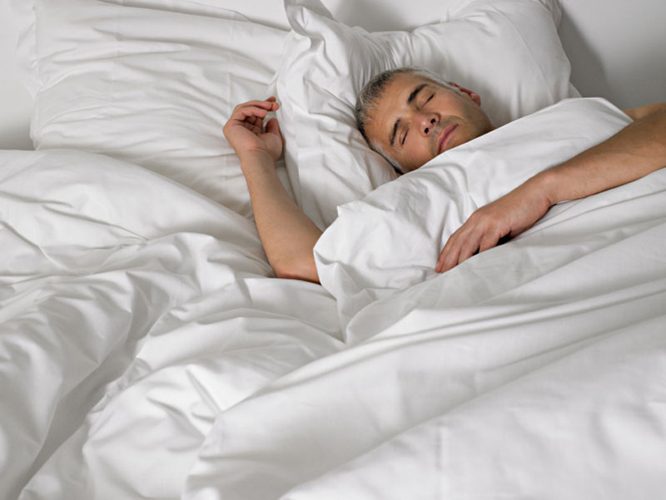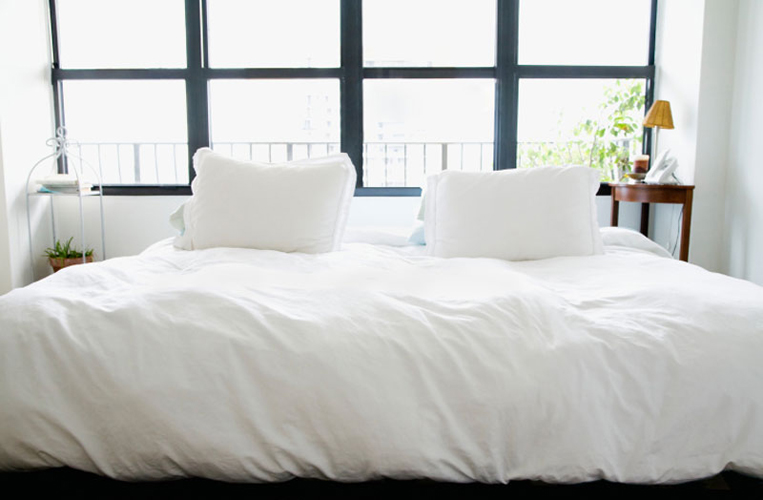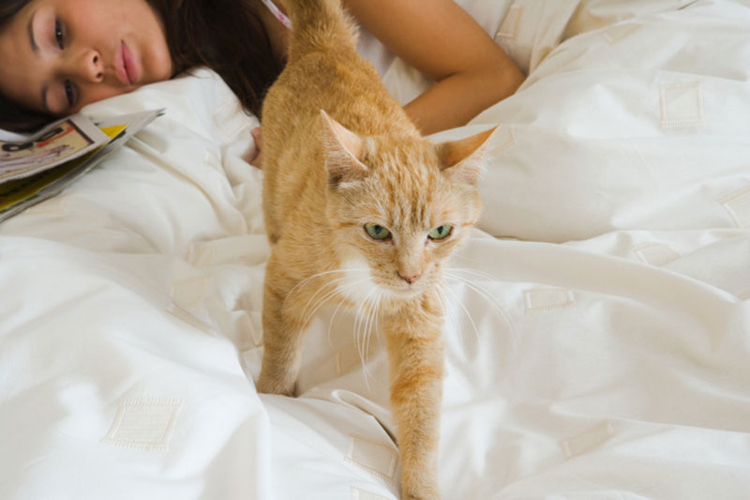| Q: |
What is the best environment for sleep?
| | A: |
Most people find that a quiet environment is most conducive to a
refreshing sleep, although this can differ on an individual basis. Some
people need the absolute quiet of the countryside (no street noise),
others feel comforted by “white” noise (noise from fans, air
conditioners, or refrigerators), and yet others need a familiar
environment with the hum of traffic outside. Generally, less noise is
better but it depends on what you are used to.
|
| Q: |
How important is my bedroom to sleep?
| | A: |
A quiet, cool bedroom provides the best environment for sleeping.
If you can afford to, try to use your bedroom only for sleep–don’t make
it a hub for family activities, your home office, watching TV, or the
general living area, especially if you have difficulty sleeping.
Sometimes this is not possible but even if your living quarters are
tight, it can help if you cordon off the area where you sleep from a
certain time at night to when you get up.
|
| Q: |
Does my bedding or bed influence the way I sleep?
| | A: |
There isn’t much in the way of scientific research in this area,
but it’s commonsense that if your mattress isn’t comfortable, your sleep
will suffer. Pillows and mattresses don’t last forever, so reassess
your sleeping environment every so often to make sure your body is
getting the support it needs at night. Is there enough room for you (and
your partner)? Do you wake up with a stiff neck or a sore back?
Mattresses and bedding need to be kept clean, and you should take into
consideration how they affect body temperature. A thick woolen blanket
in the summer won’t help you sleep.
|
| Q: |
How important is the level of light in my bedroom?
| | A: |
Generally, a darker environment is more conducive to sleep. Light affects your circadian rhythm.
Exposure to bright light late at night can potentially postpone your
sleep. Likewise, bright light, or the flickering light of a TV, during
sleep is disruptive. Some people wake up earlier in summer with the
early light and get to bed later. Ways to minimize exposure to bright
light include heavy curtains, light-blocking blinds, or an eye-mask. If
you live in an area that has very short nights or no darkness in summer
(such as Alaska), a room without windows might be the answer.
|
| Q: |
Should I be sleeping in a cool or warm room?
| | A: |
In general, a cool environment is more conducive to sleep because
it reflects the fall in the core body temperature during sleep.
Although scientists are still debating the temperature that is ideal for
sleep, somewhere around 68–77°F (20–25°C) appears to be tolerated by
most people and helps sustain sleep. A room that is either too cold or
too hot can be uncomfortable and disruptive to sleep. In fact, heat
leads to more disrupted REM sleep, increased nocturnal awakenings, and
increases in the light stages of NREM sleep.
|
| Q: |
Does humidity make a difference?
| | A: |
Humidity can also be a problem and coupled with heat can make
sleep difficult. Air conditioning or a dehumidifier can help with this
problem. On the other hand, if the air is too dry, this can lead to
discomfort as well. If you are waking up with a sore throat and dry nose
(and you’re not a snorer or habitual mouth-breather), then this could
be due to too little humidity in the air. This can be a problem,
especially with heating in winter.
|
| Q: |
I find that I am easily awakened by noise; what can I do about it?
| | A: |
As we grow older, our sleep becomes lighter and we are more prone
to disruption of any sort, including noise. If you find your sleep
being disturbed by noise, consider using the following: ear plugs,
sound-proofing measures such as double-glazing, rugs, roof insulation,
“white” noise to mask other noises (using a fan or a generator), or
relaxing music or tapes. If a noisy or restless co-sleeper is waking you
up with snoring or snoring in association with breathing pauses, ask
him or her to visit a doctor. In such cases, a separate bedroom also
helps, although this can take its toll on the relationship.
|
| Q: |
Should I have a clock in the bedroom?
| | A: |
The bedroom should be a time-free environment. However, since
many people rely on an alarm clock to wake up in the morning, most of us
have a timepiece in the bedroom. If the ticking of the clock does not
disrupt your sleep or you’re not prone to lying awake at night watching a
luminescent digital display screen, then there’s no problem. However,
if you are having problems sleeping and you are a “clock-watcher,” then
getting the clock out of the bedroom might improve your sleep.
|
| Q: |
What about pets in the bedroom?
| | A: |
Again, it is a matter of what you are used to. If you have always
slept in the same room as your pets and don’t find this disturbing,
then there is no problem. However, studies have shown that people who
sleep in the same room as their pets have more nocturnal awakenings and
disruptions than those who don’t. Also, if you are allergic to animal
dander your sleep could be worsened. If you have started having problems
with your sleep, then try sleeping without your pet in the bedroom. It
might be a wrench at first, but eventually it will do you good.
|
Myth or truth?
Myth
“You don’t need a comfortable bed to get a good night’s sleep”
Truth
If you’re tired
enough, you can probably get to sleep anywhere, on a hard floor, in the
back of a car on a long journey, or sitting upright in an armchair.
However, for sleep that is consistently refreshing you do need a
comfortable bed that feels secure. A comfortable mattress in a bedroom
that is quiet, dark, and cool, and free of electronic equipment and
clutter, is ideal.

Good and bad sleeping environments
Where and how we sleep
depends on a myriad of factors, some within and some outside our
control. If you have difficulty sleeping, consider some of the factors
in your immediate sleeping environment. Sometimes a few small changes
can make a large difference. There are no rules about bedroom color
schemes or furnishings, as long as they appeal to you.
Table | Good Environments | Bad Environments |
|---|
| A quiet, cool bedroom that is used predominantly for sleeping (not for work, study, or family activities). | A chaotic bedroom that is cluttered, messy, noisy, and used for too many purposes other than sleep. | | A dark bedroom that does not have bright lights and where the curtains block excessive light. | A bedroom that contains a computer, phone, TV, play station, and other digital and electronic devices. | | A comforter or blanket that isn’t too heavy or too light. Air that is appropriately humidified. | Air that is too dry, uncomfortable bedclothes, or a bedroom temperature that is too hot or cold. | | A comfortable mattress, box spring, and pillows that suit your needs. | A worn-out mattress and pillows that are uncomfortable to sleep on. | | A welcoming bedroom that is free from clutter and electronic devices. | Pets with a different sleep-wake cycle sharing the bed or bedroom. |




|